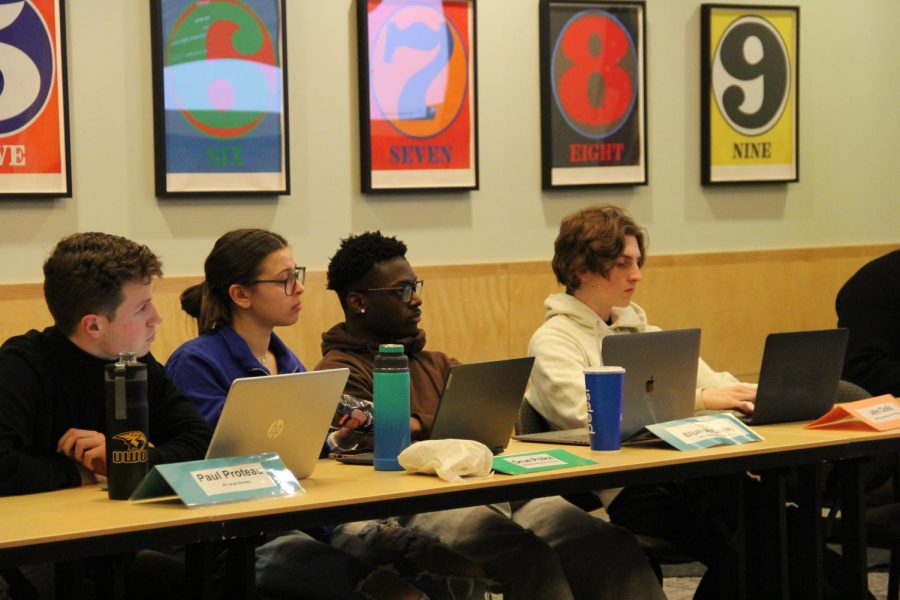UW System considers first tuition increase in a decade
Photo Courtesy of UWO Flickr / Left: Student members of OSA listen to presenters at a meeting on March 1. Right: Provost John Koker presents at an OSA meeting on March 1. He said UWO is considering a tuition increase for the 2023-24 academic school year.
March 8, 2023
UW Oshkosh will consider a tuition increase for the 2023-2024 academic year after a decade-long tuition freeze, UWO Provost John Koker announced at an Oshkosh Student Association (OSA) meeting March 1.
“While no one wants to see prices go up, it’s just a fact that we’re having a very difficult time operating on the same price that we were charging 10 years ago,” Koker said.
The announcement followed the release of Gov. Tony Evers’ 2023-2025 UW System spending plan, which budgeted $305.9 million to system spending.
The budget is approximately $130 million less than what the Board of Regents said they need to run their campuses.
In response, UW System President Jay Rothman said he will ask the Board of Regents to approve a 5% tuition increase, which he estimated will raise about $38 million annually, at the March 30-31 board meeting.
If approved, the tuition increase would increase full-time residential students’ base tuition by about $350 per student.
At UWO, in addition to the base tuition increase, there would be an increase in differential tuition, segregated fees and on-campus housing, Koker said.
“You add what we are asking for in a differential tuition increase, which is about a $120 per-student increase, a slight increase in segregated fees and an adjustment in resident life, we’re looking at a cost all-in … at about a 4-5% increase,” Koker said.
Koker said he credits the proposal for a tuition increase to high inflation rates, although the tuition increase would still be at a lower rate.
“Everything costs us more, just like everything costs you more with inflation,” Koker said. “Inflation’s still hanging around 6-7%, so we’re not quite keeping up with inflation.”
OSA Communications Director Frankie Kerkhof said that while a tuition increase wouldn’t be ideal for students, she understands the university needs more funds to provide a quality experience.
“As a student who pays for college out of pocket, I am not thrilled with the idea of paying more for an already expensive education,” Kerkhof said. “However, I understand that due to the current economic situation, a tuition increase is necessary to keep the university running the way it is.”
Kerkhof, who worked on the Differential Tuition Committee, said that an increase in differential tuition will help make up for revenue loss due to low retention rates. Differential tuition funds student resources such as the Writing Center, the Counseling Center and Career and Professional Development.
“It was challenging to decide which resources to fund with the limited money we had,” she said. “The less money we had because of low retention rates, the lower the amount of money we could provide to the campus resources.”
OSA President Daniel McKearn said that on top of the tuition increase, the university should also work to create a budget based on students’ needs.
“[The university should] use their money more wisely,” McKearn said. “Invest in programs that are working for a majority of students, look into services that really aren’t benefiting the student body as a whole.”
For students who want to continue receiving these benefits, Faculty Senate President Jennifer Szydlik said an increase in tuition is in their best interest.
“For people who care about quality education, the tuition increase is welcome news,” she said. “The entire UW System has been living under austerity for the past 10 years, and it is getting harder to protect our students from this reality.”
Szydlik said that the decade-long tuition freeze caused the university to postpone maintaining and updating campus facilities, deterring students from enrolling at UWO.
“We have deferred maintenance on our buildings and infrastructure,” she said. “We have not kept pace with our peer institutions in faculty and staff salaries, which means that we cannot compete with them for talent.”
Although Szydlik said that tuition increases would benefit the UW System, she said she encourages students to take action to minimize tuition and increase state funding.
“I wish that the state legislature would return to robust funding of the UW System, and I hope that UWO students will contact their representative to request this,” she said. “But until that happens, tuition increases are needed.”
Students interested in contacting their district representatives and senators can find their representatives’ and senators’ email addresses at legis.wisconsin.gov.














